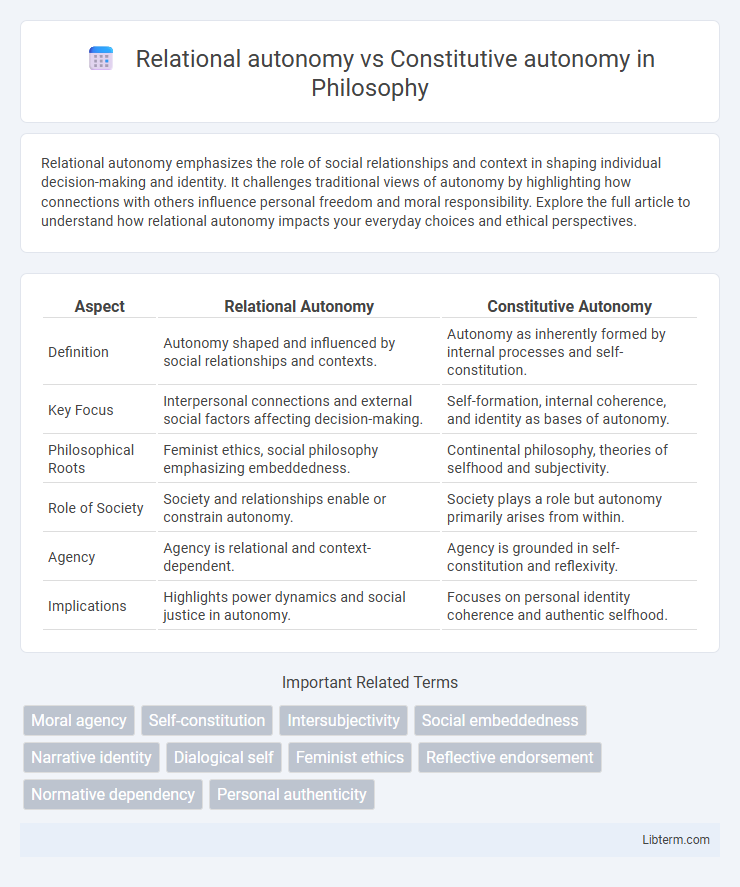Relational autonomy emphasizes the role of social relationships and context in shaping individual decision-making and identity. It challenges traditional views of autonomy by highlighting how connections with others influence personal freedom and moral responsibility. Explore the full article to understand how relational autonomy impacts your everyday choices and ethical perspectives.
Table of Comparison
| Aspect | Relational Autonomy | Constitutive Autonomy |
|---|---|---|
| Definition | Autonomy shaped and influenced by social relationships and contexts. | Autonomy as inherently formed by internal processes and self-constitution. |
| Key Focus | Interpersonal connections and external social factors affecting decision-making. | Self-formation, internal coherence, and identity as bases of autonomy. |
| Philosophical Roots | Feminist ethics, social philosophy emphasizing embeddedness. | Continental philosophy, theories of selfhood and subjectivity. |
| Role of Society | Society and relationships enable or constrain autonomy. | Society plays a role but autonomy primarily arises from within. |
| Agency | Agency is relational and context-dependent. | Agency is grounded in self-constitution and reflexivity. |
| Implications | Highlights power dynamics and social justice in autonomy. | Focuses on personal identity coherence and authentic selfhood. |
Introduction to Autonomy: Key Concepts
Relational autonomy emphasizes the social and interpersonal contexts influencing individual decision-making, recognizing that autonomy develops through relationships and social embeddedness. Constitutive autonomy highlights the inherent capacities and self-governing abilities of individuals, focusing on internal processes that constitute autonomous agency. Both frameworks are essential in understanding autonomy's multifaceted nature, linking external social factors with internal self-determination.
Defining Relational Autonomy
Relational autonomy is defined as the capacity for self-governance that is shaped and supported by social relationships and community contexts rather than isolated individual choice. Unlike constitutive autonomy, which emphasizes independence and self-determination as inherent and pre-social, relational autonomy recognizes that personal identity and decision-making are formed through interactions with others. This framework highlights the influence of social structures, dependency, and mutual responsibilities in enabling individuals to exercise authentic autonomy.
Constitutive Autonomy: An Overview
Constitutive autonomy emphasizes the formation of individual identity through social relationships, suggesting that autonomy is inherently shaped by interpersonal connections and cultural contexts. Unlike relational autonomy, which views autonomy as an ongoing negotiation within relationships, constitutive autonomy posits that social embeddedness is fundamental to the very existence of autonomous agents. This perspective highlights the role of social structures and communal interactions in constituting personal autonomy.
Philosophical Roots and Theoretical Background
Relational autonomy originates from feminist and communitarian philosophies, emphasizing the social embeddedness and interdependence of individuals, challenging the traditional liberal notion of isolated self-governance. Constitutive autonomy draws on existentialist and phenomenological traditions, highlighting the inherent capacity of individuals to self-constitute through reflective self-formation and authentic decision-making. Both theories critique classical autonomy by integrating social relationships and identity formation into the concept of self-governance.
Core Differences: Relational vs Constitutive Autonomy
Relational autonomy emphasizes the influence of social relationships and cultural contexts on an individual's capacity for self-governance, highlighting how interpersonal dynamics shape decision-making processes. Constitutive autonomy centers on the internal development of the self, focusing on an individual's inherent ability to form and modify their own values and identity independent of external factors. The core difference lies in relational autonomy viewing autonomy as dependent on social embeddedness, whereas constitutive autonomy stresses autonomy as an individual's intrinsic capacity for self-creation and self-determination.
Social Influence and Interpersonal Dynamics
Relational autonomy emphasizes the role of social relationships and interpersonal dynamics in shaping an individual's decisions, highlighting how social influence is integral to autonomy rather than a constraint. Constitutive autonomy asserts that personal autonomy is formed and continuously shaped through social interactions, where individuals internalize norms and values through relational contexts. Social influence in both frameworks is seen as a foundational force that enables autonomous agency by embedding decision-making within a network of interpersonal connections.
Autonomy in Practice: Healthcare, Ethics, and Law
Relational autonomy emphasizes the influence of social relationships and contexts on individuals' decision-making capacities, highlighting the interdependence between patients and healthcare providers. Constitutive autonomy, on the other hand, focuses on the formation of autonomous identities through ongoing interactions and self-reflection within social environments. In healthcare ethics and law, recognizing relational and constitutive autonomy challenges the traditional emphasis on isolated individual choice, advocating for patient-centered care that incorporates social and relational factors into informed consent and ethical decision-making.
Critiques and Limitations of Both Approaches
Relational autonomy emphasizes the social and interpersonal context of decision-making but faces critiques for potentially undermining individual agency by overemphasizing external influences. Constitutive autonomy highlights the formative role of relationships and social structures in shaping identity, yet it may be limited by insufficiently addressing the individual's capacity for independent choice. Both approaches struggle to balance the tension between social embeddedness and personal freedom, often leading to debates on the extent to which autonomy can be genuinely exercised within relational or constitutive frameworks.
Contemporary Debates and Emerging Perspectives
Contemporary debates on relational autonomy emphasize the interconnectedness of individuals within social and cultural contexts, challenging traditional notions of isolated self-governance. Emerging perspectives on constitutive autonomy highlight the role of social relationships not only in shaping autonomous capacities but also as essential components of autonomy itself. Scholars increasingly argue that autonomy must be understood as both socially embedded and constitutively formed through interactions, influencing ethical frameworks and policy-making in fields like bioethics and feminist philosophy.
Conclusion: Bridging the Autonomy Divide
Bridging the autonomy divide requires recognizing that relational autonomy and constitutive autonomy are complementary frameworks emphasizing the social contexts shaping individual agency. Integrating insights from both perspectives enriches ethical and philosophical understandings by highlighting how personal decision-making emerges through interpersonal relationships and socio-cultural structures. This synthesis fosters a more nuanced approach to autonomy that respects individual freedom while acknowledging the interconnectedness of human experiences.
Relational autonomy Infographic

 libterm.com
libterm.com